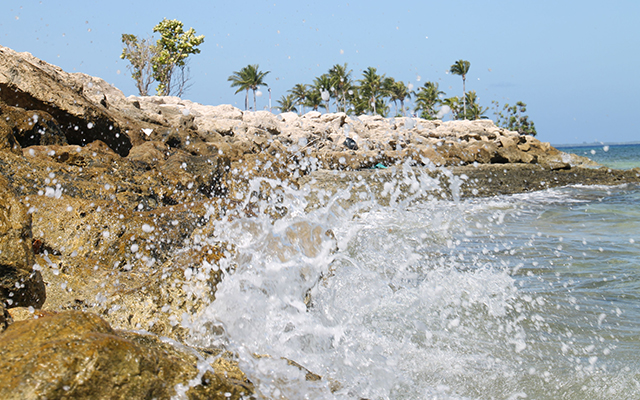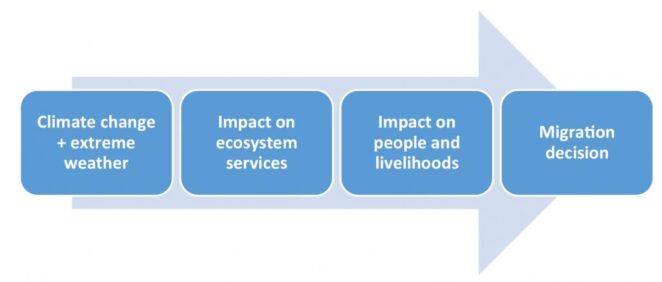Climate change, ecosystem services and migration in the Marshall Islands: are they related?

Introduction
Due to their small size and low elevation, Pacific Islands face considerable risk of inundation, coastal erosion and loss of territory when sea levels rise due to global warming and natural variability. Media outlets frequently speak of the ‘sinking islands’ of the pacific and portray their inhabitants as ‘climate refugees’. The science is more nuanced about the future of the Pacific Islands and the need to relocate.
Many Marshallese communities are already experiencing these changes that affect the habitability of their islands.
Within the Marshall Islands, there are substantial migration flows between islands, particularly from outer islands to the capital Majuro. Besides internal migration, many Marshallese are migrating internationally, particularly to the USA. Currently, it is estimated that approximately 30,000 Marshallese reside in the USA. To compare, the total population residing in the Republic of the Marshall Islands was 53,158 at the time of the last population census in 2011. There is a bilateral agreement between the Republic of the Marshall Islands and the USA—the Compact of Free Association—that allows Marshallese people to live and work in the USA without a visa.
While existing research shows that climate change is already affectingthe Republic of the Marshall Islands and population censuses show that there are significant migration flows, it is not clear towhat extent people already migrate because of climate change. This article answers the question: ‘To what extent are climatic stressors and their impacts on ecosystems, livelihoods and habitability, driving migration in the Marshall Islands?’
*Download the full article from the right hand column. The key messages from the report are provided below. See the full text for much more detail.
Conceptual framework
Ecosystem services can be defined as the benefits that people obtain from the natural environment. Central to the research is the notion that people do not migrate because of climate change as such, but because of the way climate change affects their livelihoods, food security and well-being. This is shown schematically in the conceptual framework in Fig. 1. The framework further acknowledges that impacts of climate change on people are often caused by climate impacts on ecosystems and the services they provide.

Material and methods
To study whether climatic stressors are a driver of Marshallese migration, fieldwork was conducted in the Marshall Islands, Hawaii, Oregon and Washington. Fieldwork in the Republic of the Marshall Islands took place in the spring of 2017, totaling 6 weeks.
The main data source for this article is the household questionnaire. The team interviewed a total of 278 respondents, of which 199 were in the Marshall Islands and 79 were in the USA. The questionnaire had 13 pages and the interviews took approximately 1 hour each.
Central to the design methods of this research is the acknowledgement of complexity and multi-causality in migration decisions. The team approached the question whether climate impacts on livelihoods and ecosystems drive migration in the Republic of the Marshall Islands in three different ways:
- First, by asking people why they migrated;
- Second, by exploring correlations between climate impacts on respondents’ households and their migration propensities;
- Third, through spatial correlation of migration rates and environmental data, in particular flood extent.
Please read the full article for more details on the questionnaire, site selection, sampling methods and the results.
Discussion and conclusions
- Respondents perceive that the main drivers of migration in and from the Republic of the Marshall Islands are related to education, health care, work and family networks. Less than 1% of respondents in the Republic of the Marshall Islands cite climate impacts or environmental change as drivers of migration.
- In destination areas in the Pacific Northwest of the USA, the Marshallese migrants interviewed also did not attribute their migration decision to environmental problems.
- However, in Hawaii, a much higher proportion of respondents stated that environmental problems (32.5%) and sea level rise (30.0%) had influenced their decision to migrate to the USA.
- The findings confirm that education, health care, work and family networks are prime drivers of Marshallese migration, but a more nuanced picture emerges for climatic events and other environmental drivers of migration.
- The analysis of correlations between climate impacts and migration, for example, shows that households of respondents who report heatwave and storm surge impacts and perceive that these climatic events are worsening have higher migration propensities.
- Similarly, household members of respondents who perceive negative trends in ecosystem services are more likely to intend to migrate within the next 10 years.
- Another interesting finding of this research is that almost two-thirds (62.0%) of Marshallese respondents in the USA stated that environmental factors, such as sea level rise and freshwater availability, affect their decision to return to Marshall Islands someday.
- An important limitation of this research is that the research team could only survey three study sites while the Republic of the Marshall Islands consists of 29 coral atolls and 5 raised coral islands.
- Policymakers and community representatives emphasised that this research should be considered a baseline for future research and that similar studies need to be conducted every 5–10 years and covering more islands.
Suggested citation
Van der Geest, K., Burkett, M., Fitzpatrick, J. et al. Climate change, ecosystem services and migration in the Marshall Islands: are they related?. Climatic Change (2020). https://doi.org/10.1007/s10584-019-02648-7
Related Articles
Related resources
- Marshallese perspectives on migration in the context of climate change.
- Migration, Environment and Climate Change: Evidence for Policy (MECLEP)
- Migration as adaptation? A comparative analysis of policy frameworks
- When do households benefit from migration? Insights from vulnerable environments in Haiti
- USAID Climate Change Adaptation Project Preparation Facility for Asia and the Pacific
(0) Comments
There is no content